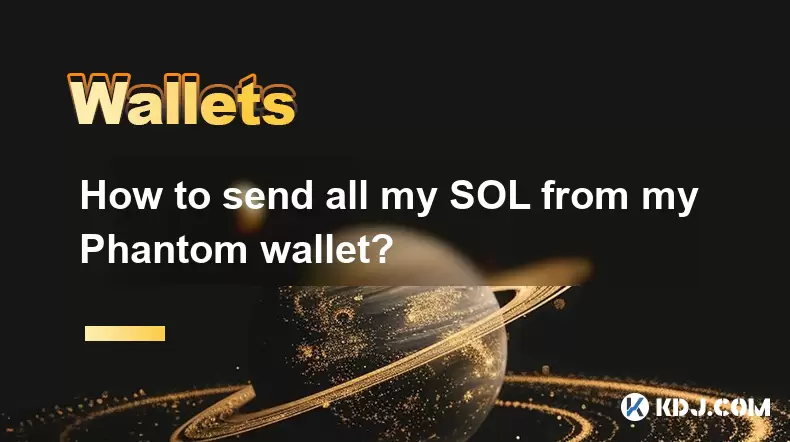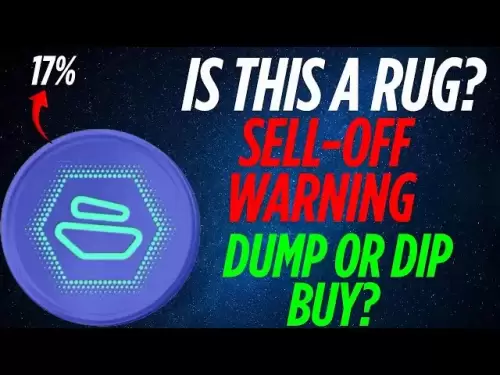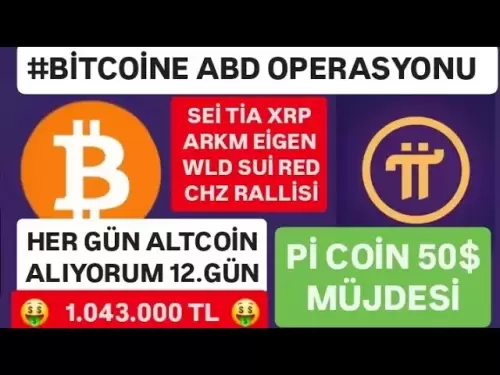-
 Bitcoin
Bitcoin $107,810.8710
-1.45% -
 Ethereum
Ethereum $2,531.4386
-1.75% -
 Tether USDt
Tether USDt $1.0000
-0.03% -
 XRP
XRP $2.2542
-0.99% -
 BNB
BNB $659.1350
-0.50% -
 Solana
Solana $148.5456
-2.40% -
 USDC
USDC $0.9999
-0.02% -
 TRON
TRON $0.2868
-0.44% -
 Dogecoin
Dogecoin $0.1666
-3.65% -
 Cardano
Cardano $0.5751
-2.36% -
 Hyperliquid
Hyperliquid $37.6845
-5.51% -
 Bitcoin Cash
Bitcoin Cash $494.9448
-0.65% -
 Sui
Sui $2.8396
-3.31% -
 Chainlink
Chainlink $13.2423
-2.59% -
 UNUS SED LEO
UNUS SED LEO $9.0482
0.02% -
 Stellar
Stellar $0.2467
-2.44% -
 Avalanche
Avalanche $17.8165
-3.63% -
 Shiba Inu
Shiba Inu $0.0...01158
-2.41% -
 Toncoin
Toncoin $2.7397
-3.42% -
 Hedera
Hedera $0.1560
-2.73% -
 Litecoin
Litecoin $85.8559
-2.34% -
 Monero
Monero $315.3710
-2.30% -
 Dai
Dai $1.0001
0.00% -
 Polkadot
Polkadot $3.3443
-2.03% -
 Ethena USDe
Ethena USDe $1.0001
0.01% -
 Bitget Token
Bitget Token $4.2888
-3.73% -
 Uniswap
Uniswap $7.3388
-1.57% -
 Aave
Aave $278.2986
-3.05% -
 Pepe
Pepe $0.0...09807
-3.67% -
 Pi
Pi $0.4563
-2.39%
How to prevent physical destruction of the storage device of a Bitcoin wallet?
Safeguarding Bitcoin requires a multi-layered approach, including secure storage (fireproof safe), regular backups of seed phrases in separate locations, and insurance for financial loss mitigation against accidental or intentional hardware wallet destruction.
Mar 24, 2025 at 08:28 am

How to Prevent Physical Destruction of the Storage Device of a Bitcoin Wallet
The security of your Bitcoin is paramount, and a significant threat comes from physical destruction of your wallet's storage device. This can range from accidental damage like dropping your hardware wallet to deliberate acts of theft or sabotage. This article explores various strategies to mitigate this risk.
First, understand the different types of Bitcoin wallets and their vulnerabilities. Hardware wallets, while generally more secure, are still physical objects susceptible to damage. Software wallets, stored on computers or mobile devices, are vulnerable to theft or device failure. Paper wallets, though offering offline security, can be easily destroyed by fire or water.
Protecting your hardware wallet requires a multi-layered approach. Consider these steps:
- Secure Storage: Keep your hardware wallet in a fireproof and waterproof safe, ideally one located in a secure area of your home. Avoid leaving it unattended or in easily accessible locations.
- Regular Backups: While you should never store your seed phrase digitally, consider creating multiple physical backups. Store these backups separately and in different locations. Remember, losing your seed phrase means losing access to your Bitcoin.
- Insurance: Explore insurance options specifically designed for cryptocurrency holdings. While this won't prevent physical destruction, it can mitigate the financial losses.
- Device Handling: Treat your hardware wallet with care. Avoid dropping it or exposing it to extreme temperatures or moisture. Regularly inspect it for any signs of damage.
Protecting your software wallet involves different strategies.
- Strong Passwords: Use long, complex, and unique passwords for your wallet and any associated accounts. Never reuse passwords. Consider using a password manager to help generate and securely store your passwords.
- Regular Software Updates: Keep your wallet software and operating system up to date to patch security vulnerabilities. Outdated software is a prime target for hackers.
- Antivirus Software: Install and regularly update reputable antivirus and anti-malware software on your devices. This helps prevent malware from stealing your Bitcoin.
- Two-Factor Authentication (2FA): Enable 2FA wherever possible to add an extra layer of security. This makes it harder for unauthorized access even if your password is compromised.
For paper wallets, the focus shifts to preservation and security.
- Laminate Your Paper Wallet: This protects it from water damage and minor tears. However, it's not foolproof against fire or deliberate destruction.
- Multiple Copies: Create multiple copies of your paper wallet and store them separately in different secure locations. This mitigates the risk of total loss.
- Secure Storage Location: Store your paper wallets in a fireproof and waterproof safe, or in a safety deposit box at a bank. Consider using a tamper-evident seal to detect any unauthorized access.
The security of your Bitcoin relies on your diligence and proactive measures. No method is completely foolproof, but by combining these strategies, you can significantly reduce the risk of losing your Bitcoin due to physical destruction of your storage device.
Frequently Asked Questions:
Q: What is the best way to store my Bitcoin seed phrase?
A: The best method is to write it down on multiple pieces of durable, tamper-evident paper, and store those papers in separate, secure, and geographically diverse locations. Avoid digital storage.
Q: Can I insure my hardware wallet against physical damage?
A: Some insurance providers now offer coverage for cryptocurrency, including hardware wallets. Check with your insurance provider or specialized cryptocurrency insurance companies.
Q: What should I do if my hardware wallet is damaged?
A: If your hardware wallet is damaged, the most important thing is to recover your seed phrase. If you have a backup, you can use it to restore your wallet to a new device. If you do not have a backup, your Bitcoin is likely lost.
Q: Are paper wallets truly secure?
A: Paper wallets offer offline security, but they are vulnerable to physical destruction, theft, or loss. Proper storage and multiple backups are crucial to mitigate these risks.
Q: How often should I back up my Bitcoin wallet?
A: Backups should be made immediately after setting up a new wallet and then regularly, perhaps every few months, depending on the frequency of transactions.
Q: What are the risks of storing Bitcoin on a computer or mobile device?
A: Software wallets are vulnerable to malware, hacking, and device failure. They require strong security practices like strong passwords, regular updates, and antivirus software.
Q: What if my computer or phone is stolen?
A: If your device containing a software wallet is stolen, your Bitcoin could be at risk. Immediate actions should include changing your passwords and contacting your wallet provider if available.
Q: Is there a completely secure way to store Bitcoin?
A: There is no completely foolproof method. The security of your Bitcoin relies on a layered approach combining hardware, software, and physical security measures. Diligence and redundancy are key.
Disclaimer:info@kdj.com
The information provided is not trading advice. kdj.com does not assume any responsibility for any investments made based on the information provided in this article. Cryptocurrencies are highly volatile and it is highly recommended that you invest with caution after thorough research!
If you believe that the content used on this website infringes your copyright, please contact us immediately (info@kdj.com) and we will delete it promptly.
- BlockDAG Leads the Web3 Race with Sports Partnerships and Strategic Pricing
- 2025-07-08 10:50:12
- Pepe, Dogecoin, Shiba Inu: Meme Coin Mania or Calculated Crypto?
- 2025-07-08 10:30:12
- Bitcoin, Ethereum, and Tariff Tussles: Decoding the Crypto Market's Latest Moves
- 2025-07-08 10:30:12
- BOOM Airdrop 2025: Claim Tokens and Join the Web3 Revolution
- 2025-07-08 10:35:12
- Ethereum, Exchanges, and Price Resilience: Navigating the Crypto Landscape
- 2025-07-08 08:30:13
- Bitcoin's NVT Golden Cross: Is a Local Top Brewing?
- 2025-07-08 09:10:11
Related knowledge

How to cancel a pending transaction in Phantom wallet?
Jul 03,2025 at 07:21pm
Understanding Pending Transactions in Phantom WalletA pending transaction in the Phantom wallet occurs when a user initiates a transfer or interaction with the Solana blockchain, but it hasn't yet been confirmed by the network. This can happen due to various reasons such as low transaction fees, network congestion, or incorrect gas settings. It's import...

How to see the estimated value of my tokens in Phantom wallet?
Jul 04,2025 at 12:21am
What is Phantom Wallet?Phantom wallet is one of the most popular cryptocurrency wallets designed for the Solana blockchain. It allows users to store, send, receive, and manage various tokens built on Solana, including SPL tokens and NFTs. The wallet offers a user-friendly interface, making it accessible for both beginners and advanced users in the crypt...

How to lock my Phantom wallet extension?
Jul 03,2025 at 11:14am
What Is the Phantom Wallet and Why Lock It?The Phantom wallet is a popular non-custodial cryptocurrency wallet designed for interacting with the Solana blockchain. Supporting both browser extensions and mobile apps, Phantom allows users to store, send, receive, and stake SOL tokens, as well as interact with decentralized applications (dApps). Securing y...

Does Phantom wallet offer two-factor authentication (2FA)?
Jul 03,2025 at 09:00am
Understanding Phantom Wallet and Its Security FeaturesPhantom wallet is a widely used non-custodial cryptocurrency wallet that supports the Solana blockchain. It allows users to store, send, receive, and interact with decentralized applications (dApps) seamlessly. As security is a top priority for any crypto wallet user, security features like two-facto...

How to send all my SOL from my Phantom wallet?
Jul 06,2025 at 10:00am
Preparing to Send SOL from Your Phantom WalletBefore initiating any transaction, it is crucial to ensure that your Phantom wallet is fully set up and connected to the correct network. Phantom supports multiple networks, but for sending SOL, you must be on the Solana blockchain. Confirm this by checking the network indicator in the top-right corner of th...

What is "rent" on Solana and how does it affect my Phantom wallet?
Jul 02,2025 at 08:35pm
Understanding 'Rent' on SolanaIn the context of Solana, the term 'rent' refers to a storage fee that users pay for maintaining data on the blockchain. Unlike Ethereum, where storage costs are paid once via gas fees during contract deployment, Solana implements a recurring cost model to ensure efficient usage of network resources. This means that any acc...

How to cancel a pending transaction in Phantom wallet?
Jul 03,2025 at 07:21pm
Understanding Pending Transactions in Phantom WalletA pending transaction in the Phantom wallet occurs when a user initiates a transfer or interaction with the Solana blockchain, but it hasn't yet been confirmed by the network. This can happen due to various reasons such as low transaction fees, network congestion, or incorrect gas settings. It's import...

How to see the estimated value of my tokens in Phantom wallet?
Jul 04,2025 at 12:21am
What is Phantom Wallet?Phantom wallet is one of the most popular cryptocurrency wallets designed for the Solana blockchain. It allows users to store, send, receive, and manage various tokens built on Solana, including SPL tokens and NFTs. The wallet offers a user-friendly interface, making it accessible for both beginners and advanced users in the crypt...

How to lock my Phantom wallet extension?
Jul 03,2025 at 11:14am
What Is the Phantom Wallet and Why Lock It?The Phantom wallet is a popular non-custodial cryptocurrency wallet designed for interacting with the Solana blockchain. Supporting both browser extensions and mobile apps, Phantom allows users to store, send, receive, and stake SOL tokens, as well as interact with decentralized applications (dApps). Securing y...

Does Phantom wallet offer two-factor authentication (2FA)?
Jul 03,2025 at 09:00am
Understanding Phantom Wallet and Its Security FeaturesPhantom wallet is a widely used non-custodial cryptocurrency wallet that supports the Solana blockchain. It allows users to store, send, receive, and interact with decentralized applications (dApps) seamlessly. As security is a top priority for any crypto wallet user, security features like two-facto...

How to send all my SOL from my Phantom wallet?
Jul 06,2025 at 10:00am
Preparing to Send SOL from Your Phantom WalletBefore initiating any transaction, it is crucial to ensure that your Phantom wallet is fully set up and connected to the correct network. Phantom supports multiple networks, but for sending SOL, you must be on the Solana blockchain. Confirm this by checking the network indicator in the top-right corner of th...

What is "rent" on Solana and how does it affect my Phantom wallet?
Jul 02,2025 at 08:35pm
Understanding 'Rent' on SolanaIn the context of Solana, the term 'rent' refers to a storage fee that users pay for maintaining data on the blockchain. Unlike Ethereum, where storage costs are paid once via gas fees during contract deployment, Solana implements a recurring cost model to ensure efficient usage of network resources. This means that any acc...
See all articles

























































































